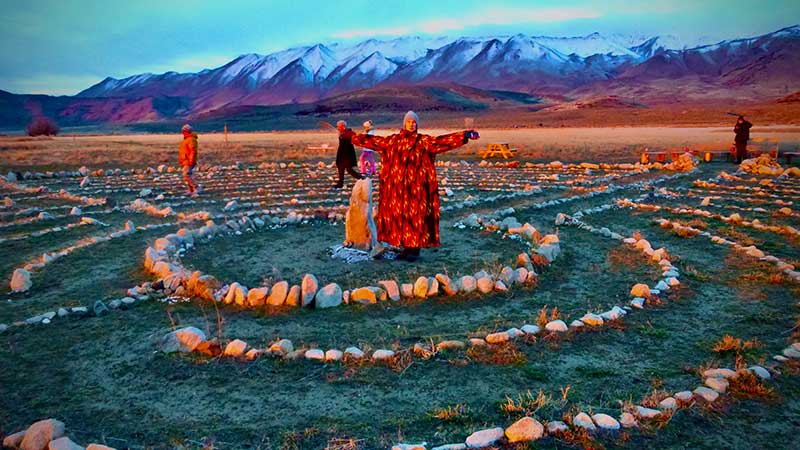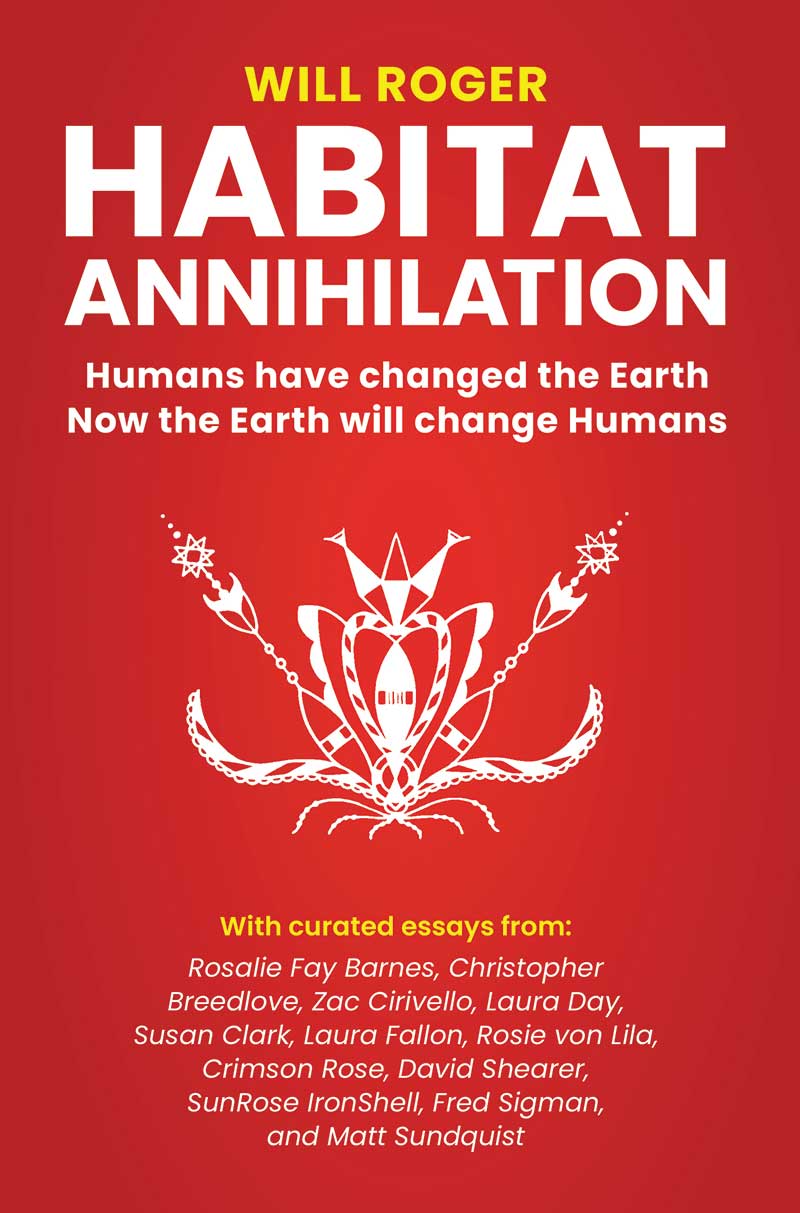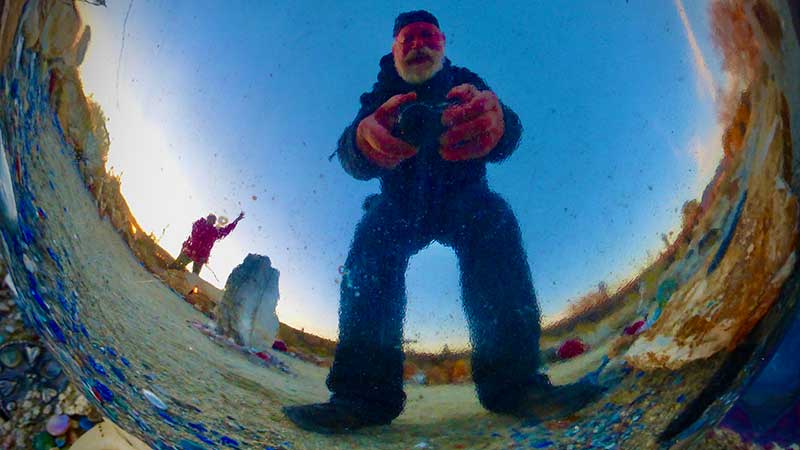
Photo of Will Roger by Crimson Rose
Will Roger
Artist, Activist and Visionary Leading the Ecological Awakening
BY LAURA HENKEL
Will Roger’s life has been shaped by his wisdom, compassion and boundless courage. With a deep reverence for the feminine and the natural world, he blends his strength with intuitive reflection, forging a path that seamlessly merges art, activism and a profound connection to the environment.
In the vibrant chaos of the 1960s counterculture, Will Roger’s journey began—performing with Theater in the Streets in New York and rallying with the Students for a Democratic Society to bring change to a world in turmoil. After teaching photography at the Rochester Institute of Technology, he embarked on a transformative hike along the Sierra Nevada Pacific Crest Trail with his first wife. Upon returning, he taught aerial photography—focusing on ancient cultural sites—to his second wife. This journey eventually led him to Burning Man, which he co-founded with his third wife, Crimson Rose, solidifying his role as a visionary leader at the intersection of art, activism and community.
Throughout his life, Will’s inspiration has consistently come from the feminine and the natural world. His path has been deeply intertwined with his lifelong spiritual connection to nature. He has called the great outdoors his home for half his life, with monumental backdrops shaping his spiritual journey.
Ten years ago, Will Roger and Crimson Rose began creating Casa El Rancho in Gerlach, Nevada—a project they call home. The stars shine brightly there, and the only traffic jam, except for the Burning Man event itself, is caused by ranchers moving sheep across the two-lane highway. Their home is as much a spiritual refuge as it is a physical one.

Labyrinth created by Crimson Rose at Casa El Rancho in Gerlach, Nevada
Sunset Rituals and Desert Magic: Embracing Nature for Ecological Healing
Every evening in Gerlach, as the sun dips below the horizon, Will Roger walks the labyrinth Crimson Rose designed at their home. More than a path, it’s a meditation carved into the earth, inviting stillness and connecting all who walk it to the land’s pulse. As the sky turns amber and rises, Will moves deliberately, feeling the cool earth beneath his feet and the fresh desert air filling his lungs. The stars emerge, and the Milky Way unfurls—a reminder of the vast interconnectedness of existence.
What began as a personal ritual of mindfulness has transformed into a portal of magic that Will Roger believes is not just his experience but is available to everyone willing to slow down and reconnect with the planet. For Will and Crimson, this practice is no mere ceremony; it is a way of being, a tangible embodiment of living fully alive on a planet that still offers wonder to those willing to seek it.
Every solstice, they make the sacred sunrise pilgrimage to the labyrinth they created at Fly Ranch, a 3,800-acre expanse of pristine wetlands, artisan hot springs and an extreme, arid landscape with expansive playa areas. Fly Ranch serves as a cultural and ecological hub, offering nature tours, rustic retreats and the opportunity to study Fly Geyser. This remarkable geothermal feature has formed colorful, otherworldly formations, making it a fascinating and unique natural landmark.
The labyrinth is just one of the art installations at Fly Ranch, showcasing the site’s commitment to conservation, education and land stewardship, available by special permission. Each Sunday afternoon, Will and Crimson continue their tradition of walking through the labyrinth, welcoming others to join them in this shared journey of reconnection to the land and each other.

“Habitat Annihilation” by Will Roger, published by Norfolk Press. Cover art: The Human Heart Floral, by SunRose IronShell, honoring traditional Dakota and Lakota visualization through the lens of nature
Habitat Annihilation: A Cultural Shift Toward Ecological Responsibility
As global movements like Fridays for Future and Extinction Rebellion call on world leaders to take bold action against climate change, “Habitat Annihilation: Humans Have Changed the Earth, Now the Earth Will Change Humans,” published by Norfolk Press, offers a deeper perspective rooted in personal connections to the land. This isn’t just about politics or technology, it critiques the systems that have driven us to this ecological crisis, pushing for more than just political or technological solutions. Will Roger’s message demands a seismic shift in how we think about Earth, and this is where true transformation begins: a profound cultural and spiritual awakening.
This isn’t merely about climate change—it’s about confronting the more immediate and destructive issue of habitat destruction. “Habitat Annihilation” serves as a rallying cry—a call for humanity to awaken, rediscover Earth’s awe and magic, and act with urgency. This visionary work blends bold analysis, personal storytelling and essays that urge readers to break free from apathy and actively participate in a cultural and ecological renaissance.
The term “habitat annihilation” might initially feel jarring, but Will Roger chose it to reflect the severity of our environmental crisis more accurately. He defines it as:
The complete and irreversible destruction of the natural environment, including ecosystems, plant and animal life, primarily caused by human activities like industrialization, resource extraction and unsustainable agricultural practices.
The ongoing degradation of Earth’s habitats due to overconsumption, fossil fuel dependence and harmful societal structures, leading to the loss of biodiversity and the planet’s diminished ability to support life.
By focusing on habitat annihilation, he challenges the traditional framework of climate change, urging readers to confront the full consequences of human activity—not just climate shifts but the systematic destruction of the habitats that sustain all life.
In his view, this destruction isn’t just an unfortunate side effect—it’s the outcome of a cultural mindset that exploits Earth rather than reveres it. The book calls for us to reconsider the systems of growth, consumption and extraction at the heart of this crisis.
But “Habitat Annihilation” doesn’t stop at critique—it offers a vision for change. Will Roger’s call for cultural transformation includes actionable insights, from redesigning urban environments to challenging “colonial capitalism,” a system built on infinite growth on a finite planet. These ideas resonate with global movements like Extinction Rebellion but offer a practical and spiritual approach that empowers individuals, communities and organizations to reframe their environmental responsibility and take meaningful action.

Will Roger reflected in a gazing orb
An Artistic Evolution and Environmental Leadership
Will Roger’s evolution into a visionary leader began long before his move to Gerlach. Rooted in his ability to bridge vastly different worlds, his journey took him from an academic career to owning a photography studio in the Bay Area. Later, he worked as a contractor by day and a performance artist by night during the transition from analog to digital. Fate ultimately led him to the Black Rock Desert to attend an event in the middle of nowhere.
To provide more context, imagine rural Nevada in the 1990s—wide-open spaces, generations of ranchers and nearby mining towns. Picture the town of Gerlach, home to only about 120 residents and five watering holes. Then add the Cacophony Society, an underground collective of anarchists, artists and pranksters known for its subversive intellect and experimental approach to art and life.
When a group of “hippies” descended upon Gerlach to create what would become Burning Man, Will Roger found himself in the unlikely role of director of operations for the city slickers while also becoming a quasi-resident of the area for much of the year. In many ways, the collision of two worlds—one urban, one rural—over the past 30+ years formed a surprisingly harmonious and mutually rewarding relationship.
Will respected the locals and their deep connection to the land throughout it all, including the Indigenous peoples whose presence and wisdom have long shaped the region. This respect for the land and its history became central to the shared journey that continues to evolve today.
Now, living in Gerlach full-time, Will Roger and Crimson Rose find the town a peaceful haven, the perfect setting for their stewardship of the land and their mission to heal the Earth and its inhabitants.
A Respected Elder: Leading the Change Toward a Sustainable Future
Having come full circle from adventurer to artist to visionary leader, Will Roger today stands as a respected elder, guiding others with the wisdom and experience he has accumulated over decades of transformative work. His ability to blend action with reflection, creativity with practicality, has positioned him as a mentor and a spiritual guide—a role he embraces with deep commitment.
In the same way, he has transformed the cultural landscape. “Habitat Annihilation” urges readers to reconsider their place within the larger ecological narrative. It is both a call to action and a challenge to reflect on our collective impact and the legacy we leave behind.
His book reflects a profound understanding of Earth’s fragile beauty while calling upon future generations to awaken and reconnect with the natural world. Through this work, Will Roger challenges us to reimagine our relationship with the planet, urging action that transcends mere awareness and leads to meaningful change.
Diverse Voices on Ecological Transformation and Social Change
What energizes “Habitat Annihilation” is its symphony of diverse voices curated by Will Roger. Each contributor brings a unique perspective, enriching the book’s message of ecological responsibility and cultural transformation.
This book is not just a read—it’s an experience. It’s a call to action that also invites profound reflection, urging readers to dive deeper into the complexities of the ecological crisis. Will’s insights are seamlessly interwoven with powerful contributions from each essayist, including an introduction by David Shearer, which sets the stage for the following discussions. Each chapter unfolds as a dynamic exploration:
- SunRose IronShell and Rosie von Lila’s “Practicing Honorably with Indigenous Wisdom” explores the integration of Indigenous wisdom into modern environmental practices and how to restore your Indigenous connection to the Earth.
- Laura Fallon’s “Rewilding the Feminine” maps a liberatory path amidst interlocking systems of oppression.
- Susan Clark’s “Human Population Control” examines how population dynamics contribute to the ecological crisis.
- Rosalie Fay Barnes’ “Sexual Education, Drag and the Divine Feminine” weaves themes of gender, sexuality and environmentalism in the context of personal empowerment.
- Fred Sigman’s “The Three Fires That Consume the Earth” explores Buddhist perspectives on greed—literal, metaphorical and cultural—that define the cause of our habitat annihilation.
- Laura Day’s “The Overview Effect” discusses the evolutionary impacts that contributed to humankind’s departure from the natural world and the epigenetic experiences that can shift our perceptions and responsibilities toward the Earth.
- Zac Cirivello’s “The History and Future of Trees” examines the role of forests in our planetary survival.
- Matt Sundquist’s “Alternatives to Universalism and the White Male Settler Contract” proposes interconnected models of justice and interconnectedness that better serve the planet and humanity.
- Christopher Breedlove’s “Building Our Future” explores sustainable and regenerative technologies.
- Crimson Rose’s “Earth Art ~ Creation Myth” offers a poetic meditation on transformation through art.
- Will Roger’s writings—”10 Points of Deconstruction-Construction, Awakening: Reimagining Humanity’s Role on Earth” and “Manifesto for a Burning Age”—form the philosophical backbone of the work.
Reframing the Narrative
Will critiques mainstream terminology, asserting, “You know the idea that in the mainstream culture we call it climate change or global warming, so I looked at those terms and thought they’re missing the point. The point is that there are millions of species of plants and animals on Earth, and humans are one of them, and we’re the only ones destroying our home. So that’s habitat annihilation, and that’s what we’re doing.”
His book also confronts the underpinnings of what he now calls “colonial capitalism”—a system that demands infinite growth on a planet with finite resources. “I don’t like looking at the Earth as a resource—the Earth is our home,” he explains. “The idea of the book is that through these other authors, I was able to look at what we have in our toolkit right now to make the change that we need to make. We have all the tools; we just … ultimately, it’s a consciousness change that we need to go through, and if we’re going to live into the future as a species, we need to do this now.”
Magic, Intention, Empowerment: A Call to Action
Yet this isn’t a book mired in gloom. It’s an electrifying blueprint for change. Will believes the chaos we face is also an unprecedented opportunity for reinvention. “It’s easy to get depressed about where we’re at and where we’re going; on the other hand, this is truly the most exciting time to be a human on the planet, and there’s an empowerment that’s happening that needs to happen. I hope my book and the contributors in the book help empower the reader to begin to see the change that we need to make and help facilitate that change. And I want everyone to begin to see the magic again.”
Magic, indeed, is what threads through the pages of “Habitat Annihilation.” Will urges us to reclaim our sense of awe— to reject soulless systems that exploit and divide and to champion sustainability, equity and reverence for all living things. His words don’t just inform; they uplift, challenge and ultimately transform. While his approach to ecological healing may be personal, it echoes larger cultural shifts toward a new paradigm in environmentalism that goes beyond policy and science to include soul-deep reconnection to Earth.
Legacy in Print: A Spiritual and Environmental Dialogue
Will Roger’s earlier works offer valuable context for his latest vision.
In “Handbook for a Burning Age,” he shares his story and how it shaped his beliefs and practices for living in balance with Earth and each other. The book is part memoir and part how-to guide for cultivating resilience and action through creative and spiritual practices. Through personal stories and works that inspired his journey, he invites readers to cultivate their art spirit as a source of deep connection with themselves, others and the planet.
“Compass of the Ephemeral” showcases Will Roger’s aerial photography of Black Rock City from 2008 – 2018, offering a stunning visual record of Burning Man’s transformation from a small gathering into a city with innovative infrastructure that inspires urban planners worldwide. The book includes archival ephemera and essays by cultural luminaries.
The Time Is Now
Will Roger’s belief in community as the engine of change pulses through every page. Systemic transformation, he insists, is rooted in cultural consciousness. Through storytelling, art and collective action, “Habitat Annihilation” equips readers with knowledge and the tools to become agents of change. It’s a manifesto wrapped in poetry—a call to arms written with heart. As environmental upheaval intensifies, this book is more than timely—it’s essential.
The future is not inevitable. It’s a canvas, and we are the artists. Will dares us to imagine a world reborn and to act with courage, creativity and conviction. In an age where nature is reduced to a resource, “Habitat Annihilation” calls us to reclaim our role as stewards of life’s interconnection and fragility. The need for change is urgent—and it’s in our hands to make a tangible impact.
For more information or to purchase “Habitat Annihilation: Humans Have Changed the Earth, Now the Earth Will Change Humans,” visit willroger.com, willroger.norfolkpress.com or flyranch.org.



Leave A Comment